September 2013 - First Peoples Worldwide
advertisement
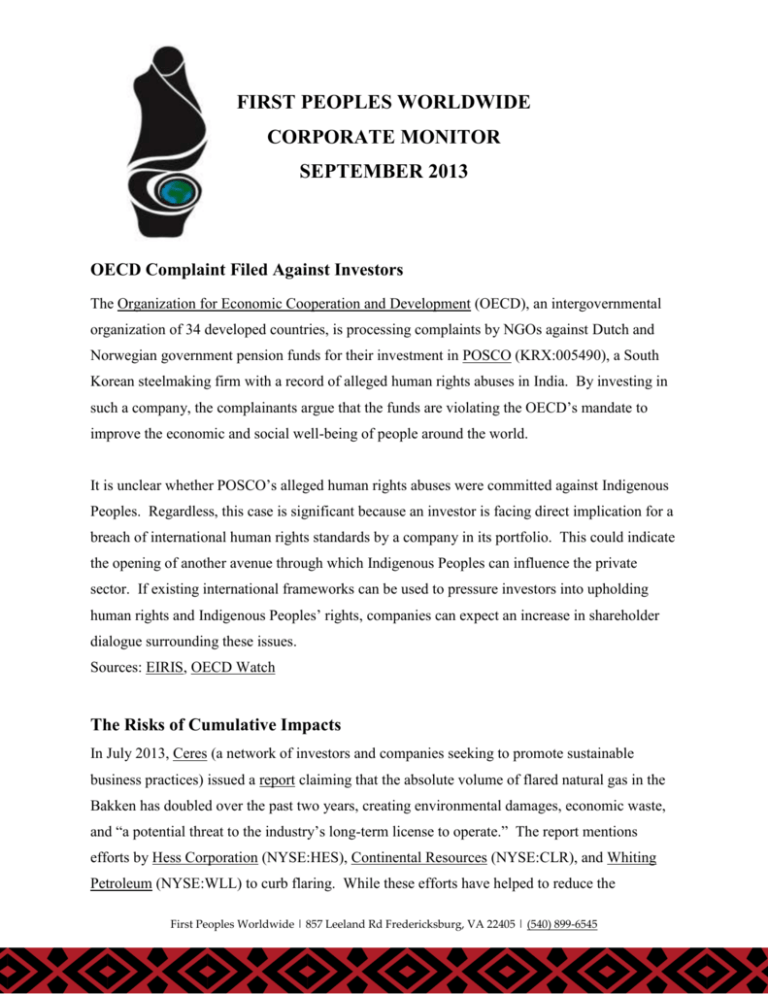
FIRST PEOPLES WORLDWIDE CORPORATE MONITOR SEPTEMBER 2013 OECD Complaint Filed Against Investors The Organization for Economic Cooperation and Development (OECD), an intergovernmental organization of 34 developed countries, is processing complaints by NGOs against Dutch and Norwegian government pension funds for their investment in POSCO (KRX:005490), a South Korean steelmaking firm with a record of alleged human rights abuses in India. By investing in such a company, the complainants argue that the funds are violating the OECD’s mandate to improve the economic and social well-being of people around the world. It is unclear whether POSCO’s alleged human rights abuses were committed against Indigenous Peoples. Regardless, this case is significant because an investor is facing direct implication for a breach of international human rights standards by a company in its portfolio. This could indicate the opening of another avenue through which Indigenous Peoples can influence the private sector. If existing international frameworks can be used to pressure investors into upholding human rights and Indigenous Peoples’ rights, companies can expect an increase in shareholder dialogue surrounding these issues. Sources: EIRIS, OECD Watch The Risks of Cumulative Impacts In July 2013, Ceres (a network of investors and companies seeking to promote sustainable business practices) issued a report claiming that the absolute volume of flared natural gas in the Bakken has doubled over the past two years, creating environmental damages, economic waste, and “a potential threat to the industry’s long-term license to operate.” The report mentions efforts by Hess Corporation (NYSE:HES), Continental Resources (NYSE:CLR), and Whiting Petroleum (NYSE:WLL) to curb flaring. While these efforts have helped to reduce the First Peoples Worldwide | 857 Leeland Rd Fredericksburg, VA 22405 | (540) 899-6545 percentage of flared natural gas relative to total production, the absolute volume of flared gas continues to rise rapidly in conjunction with the sharp increase in production. It is laudable for companies to be proactive about reducing the environmental impacts of its operations beyond state requirements. Yet these efforts are at risk of being in vain if more collaborative approaches to mitigating flaring are not taken. Communities are unlikely to recognize the positive efforts of individual companies if they are overwhelmed by the cumulative negative impacts of entire industries. Sources: Ceres Victory for Indigenous Land Rights in Honduras In August 2013, five Miskito communities along the Honduran coast secured legal title to 1.6 million acres of their traditional territories. According to a Honduran government spokesman, companies that want to operate in the region will now be required to talk to the communities first. While it is unlikely that this will halt all unwanted development activities on Miskito lands, it will provide the Miskito with a legal foundation for challenging projects undertaken on their traditional territories without FPIC. When Indigenous communities earn legal title to their traditional territories, it does not guarantee full protection of their rights enshrined in the UN Declaration on the Rights of Indigenous Peoples. The boundaries of these territories are often ignored by governments and companies, and communities are frequently subject to external manipulation of their traditional decisionmaking structures. This is an important victory for Indigenous Peoples in Honduras, but it does not preclude the need for companies operating on Miskito lands to conduct additional due diligence to ensure that their activities are in compliance with international standards. Sources: New York Times, Huffington Post The Importance of Inclusive Engagement The Environmental Protection Agency (EPA) is permitting oil companies to dump fracking wastewaters on the Wind River Reservation in Wyoming, which is home to the Eastern First Peoples Worldwide | 857 Leeland Rd Fredericksburg, VA 22405 | (540) 899-6545 Shoshone and Northern Arapaho tribes. While such dumping is illegal in the rest of the state, it is allowed on the reservation due to the prevalence of cattle ranching in the community. The wastewaters provide an important drinking source for cattle during the dry season, with ranchers claiming that “polluted water is better than no water.” Although the dumping is supported by cattle ranchers, other community members are concerned about the potential health risks of the wastewaters, which contain known carcinogens and radioactive materials. Companies operating on the Wind River Reservation should ensure that the voices of cattle ranchers are not drowning out the voices of the community at large. Companies should also refrain from holding themselves to weaker environmental standards on Indigenous territories, even if doing so is permitted by the government. Sources: National Public Radio, Indian Country Today The Cost of Ignoring FPIC in the Arctic Native Alaskans are petitioning the Environmental Protection Agency (EPA) to preempt construction of the Pebble Mine by Northern Dynasty Minerals (NYSEMKT:NAK) and Anglo American (LSE:AAL) in the Bristol Bay watershed. The communities want to invoke Section 404 of the Clean Water Act, which authorizes the EPA to halt projects with “unacceptable adverse effects” on ecosystems. In response, the EPA conducted an assessment prior to issuing permits for the mine (EPA assessments normally occur after the permitting process). The EPA assessment found that the mine could have “deleterious effects on 80 miles of streams and 4,800 acres of wetlands, even without a mine process accident.” The company called the EPA assessment a “cynical effort to manipulate public perception about the project” and is performing its own studies. The communities’ opposition to the mine is supported by conservationists, businesses, commercial and recreational fishermen, state and federal politicians, and investors. According to Seeking Alpha, “given the negative, widespread publicity that this project has received, rightly or wrongly, entering a position with [the Pebble Mine] would be in search of a long, long shot.” Sources: Seeking Alpha First Peoples Worldwide | 857 Leeland Rd Fredericksburg, VA 22405 | (540) 899-6545 New Standards for the Palm Oil Industry Agropalma (Brazil), Daabon (Colombia), Golden Agri Resources (Indonesia), and New Britain Palm Oil (Papua New Guinea) are among the palm oil companies partnering with NGOs (including Greenpeace, the World Wildlife Fund, and the Forest Peoples Programme) to form the Palm Oil Innovation Group (POIG). POIG’s mission is to establish social and environmental standards for the palm oil industry that are stronger than those set forth by the Roundtable on Sustainable Palm Oil (RSPO). The RSPO’s recent revision of its Principles and Criteria was criticized by many environmental groups for being too weak. POIG is significantly smaller than the RSPO, which its members claim will enable it to act more efficiently and ambitiously. Palm oil production frequently occurs in remote forested areas inhabited by Indigenous Peoples. The RSPO’s Principles and Criteria contain numerous references to Indigenous Peoples’ right to Free, Prior, and Informed Consent. POIG has yet to publicly release its standards, and it is unclear whether Indigenous Peoples will be involved or included in them. Sources: CSR Asia, Eco-Business Understanding Unique Systems of Land Use Development of the Bovanenkovo Gas Field by Gazprom (Public: Russia) is negatively impacting Nenet reindeer herders in Siberia’s Yamal Peninsula. Although the physical footprint of the field itself is relatively small, it sits on lands that are crucial to two of the herders’ four seasonal migration routes. This is resulting in a major loss of access to grazing fields for reindeer, which form the economic and cultural basis of Nenet livelihoods. The herders’ lifestyles are further jeopardized by the construction of roads, pipelines, and other infrastructures needed to support the field. The traditional territories of herders and other nomadic communities can span vast tracts of land, and are sometimes difficult to clearly demarcate on a map. When doing business on the traditional territories of nomadic communities, companies should remain aware of their unique systems of land use and ensure that their operations do not adversely impact seasonal migration routes or access to grazing fields. Sources: Pastoralism Journal First Peoples Worldwide | 857 Leeland Rd Fredericksburg, VA 22405 | (540) 899-6545



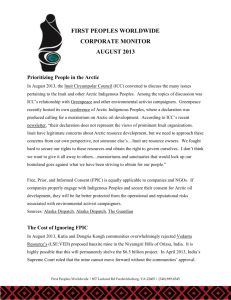

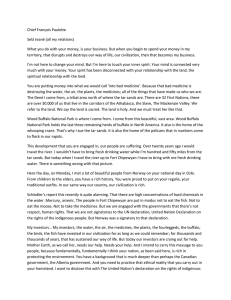
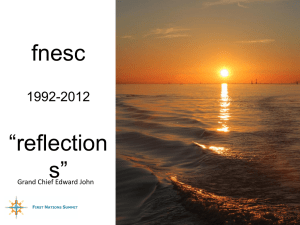
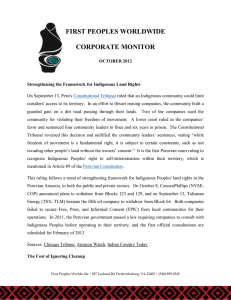

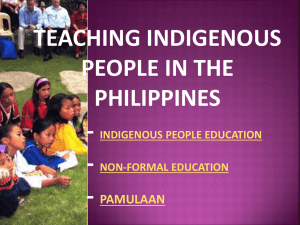

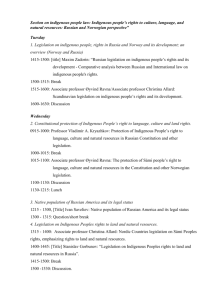
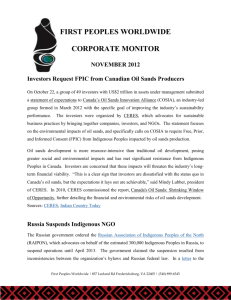
![Annex [#]. Social and Environmental Screening Template](http://s3.studylib.net/store/data/006861177_1-96de11e04a0be0f1b9c3238916c93882-300x300.png)